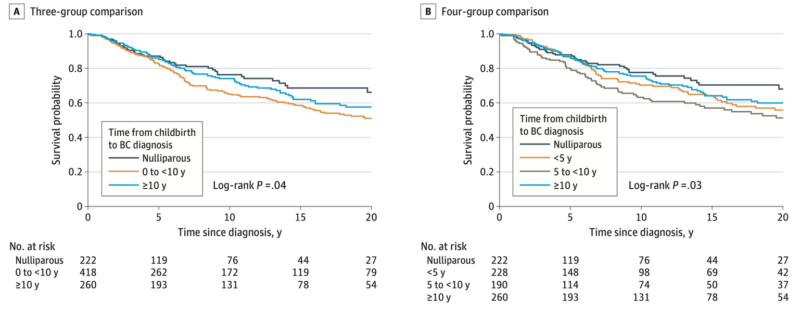
Piotr Wysocki: Postpartum breast cancer in BRCA1/2-mutation carriers is associated with poor outcomes, especially in patients with BRCA1 mutations
Piotr Wysocki, Professor of Medicine and Head of the Department of Oncology at Jagiellonian University Hospital, shared on LinkedIn:
“A prospective study by Zhang Z et al. published in JAMA Network Open analyzed 903 women with germline BRCA1/2 mutations who were diagnosed with stage I-III breast cancer (BC) at age 45 years or younger between 1950 and 2021 in the C. Within the studied population – 419 women received a BC diagnosis during the postpartum period (0 to <10 years after childbirth), including 228 women diagnosed < 5 years after childbirth and 191 women diagnosed 5-10 years after childbirth.
BRCA2 was the dominant mutation among women with ER-positive BC, ranging from 62.3% among the nulliparous group to 75.0% among the PPBC. Among women with ER-negative BC, BRCA1 mutations were dominant, reaching 87.3% in the patients diagnosed with the PPBC within 5 years after childbirth.
Compared with nulliparous women and women diagnosed with BC 10 or more years after childbirth, patients diagnosed within 5-10 years postpartum had a significantly increased risk of all-cause mortality (HR=1.56; 95%CI 1.05-2.30).
The risk of mortality compared to nulliparous patients was greater for:
- ER-positive BC diagnosed <5 years postpartum (HR=2.35; 95%CI 1.02-5.42)
- ER-negative BC diagnosed between 5 to 10 years postpartum (HR=3.12; 95% CI 1.22-7.97)
The risk of death in the 5-10 years postpartum group was significantly increased only for BRCA1 carriers (HR=2.03; 95%CI 1.15-3.58), typically enriched in ER-negative BC phenotype.
The study by Zhang Z et al. demonstrated that the well-known phenomenon of poorer outcomes in patients diagnosed with breast cancer within a decade after childbirth is also true for BRCA1/2 mutation carriers. Additionally, the risk seems extremely critical in BRCA1 mutation carriers, which are more often diagnosed with aggressive, ER-negative phenotypes.
There is currently no approved treatment for patients diagnosed with post-partum breast cancer, however, a few studies evaluating antiinflammatory agents for instance aspirin are ongoing.
Personally, in patients diagnosed with breast cancer within a decade after childbirth, I discuss the available data suggesting a promising activity of aspirin in reducing the risk of loco-regional relapse and liver metastasis. Many of my patients decide to start on low-dose aspirin (75-150 mg daily) after completing standard adjuvant treatment.”

Read further.
Source: Piotr Wysocki/LinkedIn
About OncoDaily
OncoDaily was founded in 2023. It is a US-based oncology media platform, that features the latest news, insights, and patient stories from the world of oncology. Within a short period of time, it became one of the leading oncology media platforms globally.
OncoDaily gathers content from various sources, including social media posts from renowned oncologists from all over the world, news from oncology societies and cancer centers, patient and survivor stories, and career-related information for professionals.
The mission of OncoDaily is to empower patients, survivors, and professionals with the knowledge and inspiration they need to fight cancer. The motto of OncoDaily is “Cancer doesn’t take a day off – neither do we”.
